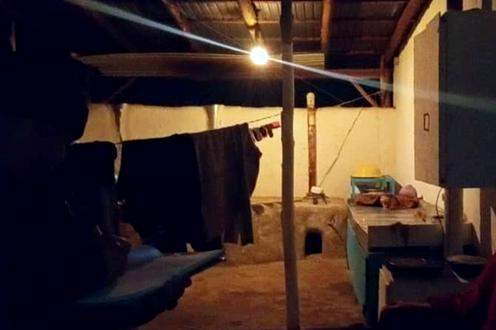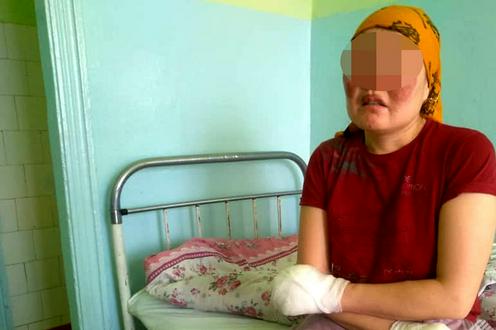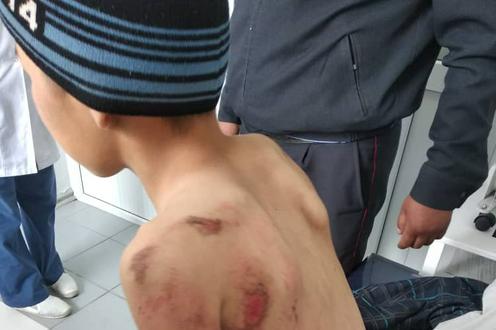Over the New Year holidays in Kyrgyzstan, two women died after being severely beaten by their husbands. Immediately a public debate erupted in the country on the subject of domestic abuse. On 9 January, Prime Minister Mukhammedkalyi Abylgaziev directed a parliamentary commission to speed up legislative reforms in the fight against intra-family violence. This is not the first time the country has seen this kind of frenzied ad hoc campaign – in 2018 Kyrgyz society took a collective stand against “bridenapping”, and in 2019 rose as one to denounce violence against the children of migrant workers. Yet it can hardly be said that either of these noisy crusades did much for the eradication of the phenomena in question.
A family occasion
On the evening of the 31 December, Kyrgyz citizen Sagynbek Sadabaev phoned his younger sister, living in Jany-Jol village in the Naryn region, to wish her a happy new year. His sister’s husband answered the call. He said that she was unable to come to the telephone at that moment. Sadabaev invited the couple to see in the New Year with him. His brother-in-law answered that they already had plans to celebrate the New Year with friends but promised they would pay his wife’s relatives a visit the following day.
At 2 am on the morning of the 1st of January, Sadabaev received a call from unknown people. They told him that his sister was in intensive care. The woman’s relatives quickly drove to the hospital, but were told that there was no record of any patient by her name. Neither did the ambulance services know anything about her. Then the family members went to the woman’s home. A crowd of people was gathered around, but none were able to explain to them what had happened. Soon the police arrived. Eventually they explained to the woman’s bewildered relatives that the woman had died. The following day they were taken to the morgue to collect her body. The woman appeared to have been severely beaten and some of her hair had been pulled out.
Back at the police headquarters in Naryn, the family was told that at 00:40 on 1 January a paramedic had been called to an address in Jany-Jol village. When he arrived, he found the body of a 36-year-old woman in a bedroom. The police quickly arrested the woman’s 33-year-old husband. The man confessed to having beaten his wife, saying that they had been arguing about money. According to the man’s statement, he twice struck the woman in the face, and when she fell, he had started kicking her.
Sadabaev told journalists that this was not the first time his sister had been beaten by her husband. The family had tried talking to the husband, but nothing had helped. The man had recently turned to religion and begun to visit the mosque. The family had hoped that this would bring a change to his behaviour – in vain, as later became clear. The couple had four children – the youngest was in the second grade and the eldest was in his last year of school. All of the children were at home when the beating took place.
(
Four days later, on the night of the 3rd of January, a 26-year-old woman from Batken was brought in to the town’s regional hospital. Her husband had initially called the emergency services, but then, without waiting for the ambulance to arrive, drove her to the hospital himself. To medics he said that the woman had fallen, but the woman’s injuries told a different story. Her body was covered with bruises and burn marks. Doctors were unable to save the woman’s life.
The deceased woman’s husband was arrested on suspicion of beating her to death. He soon admitted that at around 18:30 on 3 January, he had gotten into an argument with his wife and begun to beat her. Later that night he realised that the woman’s injuries were too serious to be left untreated and had tried to save her, but it was too late. The couple had three children.
Public anger
Both of the above stories were reported almost simultaneously by the media in Kyrgyzstan, on 4 January. Due to the New Year’s holidays, the public reaction was a little delayed, but gradually the two murders became one of the most-discussed topics in Kyrgyz media and on social media platforms in the country. Curiously, one of the first to react to the two cases was Zamirbek Kochorbaev, leader of the organisation Kyrk Choro, set up to defend traditional values. On 8 January, the first working day after the holidays, he claimed that the situation of women in the country had worsened following the passage of a new Criminal Code and a number of other laws that had come into effect on 1 January 2019.
“The heads of one regional police department told me that after the enactment of the new legal codes, the police have their hands tied when it comes to cases of domestic abuse. Whereas before they could at least lock up a troublemaker or violent drunk for a fortnight, now this is not possible,” Kochorbaev explained. And, of course, he added: “Do you want to know who it was that wrote these laws? It’s the West that put millions of euros into drawing up the new codes, Western experts wrote them.”
There have indeed been a number of flaws in the application of the new codes in Kyrgyzstan, and the new legislation certainly cannot be described as perfect. Yet the Kyrgyz law enforcement system has long been known for its relative leniency not just towards perpetrators of domestic violence but also towards common rapists. Women who have been the victims of abuse or rape are often forced to seek the assistance of rights organisations and the media to obtain justice – in other words, the very forces that Kyrk Choro considers “agents of the corrupting West”. And even their efforts are usually not sufficient to ensure a jail term. Kochorbaev’s position thus seems a slightly odd one.
On the same day, 8 January, the Ministry of Labour and Social Development of Kyrgyzstan announced that it would implement a programme of preventive action against domestic violence and even planned to open two state-run shelters for victims. But according to the Ministry of Social Development, the country’s finance ministry refused to allocate the necessary funds for the project. For this reason, victims of domestic violence will have to make do with the 14 non-governmental centres currently in existence, only two of which (in Bishkek and Osh) are able to offer victims accommodation (in other words, are actual shelters).
Finally, on 9 January, the Prime Minister of Kyrgyzstan Mukhammedkalyi Abylgaziev gave an impassioned speech on the unacceptability of domestic violence. “We need to create a climate of zero tolerance for violence against women and children in the country. Each of us has to understand that domestic peace and harmony is one of the most valuable things in life,” he stressed. As far as concrete measures are concerned, Abylgaziev announced that a working group had already been formed at an earlier date tasked with drawing up new legislation for the fight against domestic violence. The government would now instruct the group to redouble its efforts.
A fiery passion
On 9 January, Kyrgyz media reported on yet another family dispute with criminal consequences. It emerged that on 4 January (the very same day that the woman from Batken was beaten to death) in Karakol in the Issyk-Kul region, a 34-year-old market worker was doused in petrol and set on fire by her ex-boyfriend. The woman was taken to hospital with third-degree burns to her hands, legs and face. It is entirely possible that if it hadn’t been for the deaths of the two previous victims of domestic abuse, the incident would not have received widespread coverage in the media. But as a result of the heightened sensitivity surrounding the issue, the victim was given the chance to tell her story.
She told journalists that she had been living with a man since 2017, without officially registering as married. In 2018 he was arrested for stealing a refrigerator, but managed to settle the matter out of court. Immediately after this, he began to threaten her with a knife, and she filed a police report against him. Following this, the man did finally end up in prison. In 2019 he was freed, and the woman agreed not only to live with him once again, but also to support him on the wages she earned at the market. The man then became prone to bouts of jealousy, imagining that she could be flirting with customers at work.
In December, the couple finally split up, the man himself pronouncing talaq (traditional Muslim divorce) to her. In spite of this, he continued to follow her, turning up drunk to where she worked at the market, and once spat in her face and swore at her on the bus. On 3 January, the man told the husband of one of his ex-girlfriend’s friends that he was planning to set her on fire. The friend and her husband told the woman to be on her guard. But on the 4 January, the man again went to the marketplace and carried out his plan.
According to the victim, she was in a kiosk loading goods at the time of the attack. The ex-boyfriend sneaked up on her, locked the kiosk, doused it in petrol and set it on fire. “It started to burn, my dress stuck to my legs. I tried to get out through the window – half my body was inside and half outside. A lot of people gathered around, they called an ambulance,” the victim recounted. The attacker managed to flee the crime scene but was later arrested by police. He is currently in custody, charged with attempted murder.
Dear uncle
It may seem as if the arrest of the suspect in the above case and the criminal charges brought against him mean that justice will in the end be served. But in Kyrgyzstan such a development is far from a guarantee that a domestic despot will receive his just rewards, nor that the victim will find respite. Firstly, it should be remembered that the perpetrator in the above story had already served a prison sentence for threatening the woman in question with a knife. Now, of course, he is charged with a far more serious crime, but this does not mean that a court will not treat him with leniency. And it is not just a matter of the courts: a vast number of criminal cases in Kyrgyzstan are settled before they even reach the courts, through “reconciliation with the victim”. Sometimes this phrase can conceal an unofficial payment of compensation, sometimes threats, and sometimes the simple desire not to sour relations with numerous relatives.
It is possible that something along these lines happened on 9 January in Bishkek. On that day, the Pervomayskiy District Court ended criminal proceedings against a man who less than a year previously had been the protagonist of a huge media scandal in the country. In April 2019, residents of the Altyn-Kazyk housing estate called the police and reported that a man was beating a child in full public view. When police officers arrived, they saw a seven-year-old boy with cuts and bruises together with his 33-year-old uncle. Neighbours told them that the uncle had accused his nephew of stealing money from his grandmother, and then tied him to a car and dragged him around 20 metres. The boy was taken to hospital.
It emerged that the boy was being raised in the home of his grandmother, since his mother was away working in Russia. At the start of 2019, the fate of migrant workers’ children was in the media spotlight in Kyrgyzstan in the same way that that of battered women is today. A number of cases had been reported of pre-school children whose parents had gone abroad to work who had been beaten to death by relatives. Public anger was roused, and the government set up a special register of migrant workers’ children. As a result, the events in Altyn-Kazyk garnered significant public interest. The investigation was conducted under the personal supervision of the Ombudsman of Kyrgyzstan Tokon Mamytov.
But these kinds of media campaigns in Kyrgyzstan come in waves. These days, discussion of the fate of migrant workers’ children has died down. Did anything concrete come out of the widespread public debate on the topic? The decision of the Pervomayskiy Regional Court certainly does not give much cause for optimism. In court, standing alongside his mother who had now returned from Russia, the boy who had earlier recounted how his uncle had tied him to the back of his car and pulled him along the street, now changed his story. He said that he loved his uncle and that the man had never beaten him. The injuries, the boy explained, were the result of falling down the stairs. The story that there had never been any dragging by car was confirmed by a number of witnesses. What happened to the neighbours who had earlier reported witnessing an “execution” is not known.
The boy’s mother said that she had no grievance against her brother since he had given her compensation for the moral and material damage caused. The court reclassified the case, replacing the rubric “Disorderly conduct, with the use of objects intended to cause bodily harm” with simply “Disorderly conduct”. The case was subsequently closed due to the reconciliation of the parties involved. What was this “disorderly conduct” and why did the man pay compensation if he didn’t beat the child? These questions remain a mystery. No public outburst followed the decision: migrant workers’ children are no longer in vogue; now everyone wants to hear about battered women.
A family starts with violence
So the “human rights fashion” of the start of 2020 in Kyrgyzstan is domestic violence against women, and the trend of 2019 was violence against the children of migrant workers. In 2018, the whole of Kyrgyz society was instead mobilised in the fight against “bridenapping”. By this, of course, is meant the rather liberal interpretation of the national custom of “ala kachuu” whose popularity has been on the rise in the country in recent years. Scholars of Kyrgyz culture inform us that, in traditional Kyrgyz society, the term “ala kachuu” denoted a girl’s voluntary elopement with her loved one. The practice that now goes under this name was in fact of old known by the label “zorduk” – forced abduction and rape.
This “custom” works as follows: Young Kyrgyz men today sometimes save themselves the hassle of making acquaintances and wooing their prospective brides and simply bundle the girl of their fancy into a car and carry her back home. Once she is there, the kidnapper’s relatives persuade the girl to marry him. They remind her that, by tradition, a girl who returns to her parents’ home after being kidnapped is considered to be disgraced. Not infrequently the ruse works, the Muslim cleric summoned to the family’s home quickly conducts a nikah (the Muslim marriage ceremony), and the young couple begin their married lives together (sometimes only to fall out a few years down the line and go and work abroad, leaving their young children in the care of violent relatives).
In May 2018, one such “romantic escapade” ended in tragedy. After having been arrested, kidnapper Mars Bodoshev was able to stab his 19-year-old-victim Burulay Turdalieva to death right in the middle of the police station. The case provoked an intense public reaction. Burulay became a household name, films were made about her, songs were written, a public service campaign was launched. For a time after her death, each new case of ala kachuu was widely covered in the country’s media. In the autumn of 2019, Bodoshev was sentenced to 20 years in prison, and the three police officers who were present at the scene were sanctioned for negligence. Two other officers were acquitted.
It seemed as if this would be the breakthrough, and that bridal kidnappings in Kyrgyzstan would soon be a thing of the past. But even before the sentenced was pronounced, everything quietened down, and ala kachuu again began to be portrayed in a positive light in Kyrgyz gossip columns and on Kyrgyz screens. In the first half of 2019, 118 girls were abducted this way – and this is of course just those cases that became known to police. Reports of new kidnappings are still published in the media, but they no longer provoke much of an outcry.
Love under duress
In December 2019, Nursalima Sovetbekova, a resident of the Issyk-Kul region, contacted journalists and told them a tale of something even darker than ala kachuu. According to her version of the story, the kidnapper did not even try to justify his actions with the desire to start a family. All he wanted was sex and violence.
According to Sovetbekova, until recently she had been living as a single mother in the home of her parents. At the start of September, she stayed with a friend at the home of a man who rented out rooms. A friend of the owner by the name of Aziz first raped her and then, two days later, tracked her down and told her that if she didn’t agree to live with him then he would kill her children and parents. The man is said to have told her that he could do what he wanted, since he had relatives working at the local police station. The victim and her kidnapper ended up living together for around three months in the same house of Aziz’s friend. Sovetbekova then became pregnant and asked Aziz if she could get an abortion. He refused. She then decided to go to the police and file a complaint for rape and battery, but it turned out that Aziz hadn’t been lying when he said he had a number of relatives in the local police.
On 8 January, Sovetbekova told journalists that in retribution for her going to the media, Aziz had beaten her and thrown her in Issyk-Kul lake. Shortly after this, Issyk-Kul regional police department announced the results of their interrogation of the accused. According to him, Sovetbekova had been living with him voluntarily but they got into an argument over her unwillingness to officially divorce her husband. Aziz claims that they together decided to terminate the pregnancy, but that he then found out from doctors that she herself had refused to go through with the abortion. After this she tried to blackmail him for money, and when he refused, threatened to “make him an internet star and rot in jail”. The police also stated that Sovetbekova’s claims of the initial rape by Aziz had not been corroborated by the only available witnesses – the owner of the house and his girlfriend, Sovetbekova’s friend.
On 9 January, the Issyk-Kul regional police department announced that the rape case involving Sovetbekova had been closed due to a lack of evidence, and that investigations into battery and disorderly conduct were continuing. They added that a psychiatric evaluation had established the plaintiff to be prone to fantasies (but sane).
In the case of Sovetbekova and Aziz, it is indeed difficult to work out the measure of truth on each side. It is entirely possible that both of them genuinely believe what they say. From the man’s point of view, he showed persistence and got what he wanted. From the point of view of the woman, she had put up with enough and could take no more. What really happened between the two will remain a matter of individual interpretation as long as society retains the stereotype that it is natural for a man to get what he wants through being insistent (even by using his fists), and for a woman to put up with things and struggle on (even while hiding her bruises). Otherwise we remain on the shaky ground of trying to establish whether someone “was too insistent or not”, and someone else “put up with enough” or not, “suffered enough” or not.
Law enforcement officers, of course, should not refuse to file complaints of rape and domestic abuse, or protect their own relatives and take bribes. But it’s worth reminding ourselves that not everything depends on law enforcement officials. All the while that police and judges know that a woman who has been subjected to death threats might simply carry on living with her tormentor after he has served his time, they are unlikely to treat such cases with the level of seriousness they deserve. And as long as the mothers of children mistreated by relatives request leniency for the culprits, it will be hard for judges to mete out sufficiently severe sentences.
After all, why do men hit, and why do women put up with it and teach children to do the same? Because they think that that is what is “normal”, that “that’s what everyone does”, that “love and passion are not possible without it”. In other words, it’s a question of fundamental values and attitudes. And in order to change social attitudes, rather more serious efforts are required than sporadic media campaigns around particularly sensational crimes.
Tatyana Zverintseva
Translated by Nick L.
-
 05 February05.02The “Guardian” of Old Tashkent Has Passed AwayRenowned local historian and popularizer of Uzbekistan’s history Boris Anatolyevich Golender dies
05 February05.02The “Guardian” of Old Tashkent Has Passed AwayRenowned local historian and popularizer of Uzbekistan’s history Boris Anatolyevich Golender dies -
 23 December23.12PhotoTokyo DriveJapan to invest about $20 billion in projects across Central Asia over five years
23 December23.12PhotoTokyo DriveJapan to invest about $20 billion in projects across Central Asia over five years -
 17 December17.12Sake for SixCentral Asia’s Rapprochement with Japan Comes with Hidden Pitfalls
17 December17.12Sake for SixCentral Asia’s Rapprochement with Japan Comes with Hidden Pitfalls -
 24 November24.11Here’s a New TurnRussian Scientists Revive the Plan to Irrigate Central Asia Using Siberian Rivers
24 November24.11Here’s a New TurnRussian Scientists Revive the Plan to Irrigate Central Asia Using Siberian Rivers -
 11 November11.11To Live Despite All HardshipUzbek filmmaker Rashid Malikov on his new film, a medieval threat, and the wages of filmmakers
11 November11.11To Live Despite All HardshipUzbek filmmaker Rashid Malikov on his new film, a medieval threat, and the wages of filmmakers -
 22 October22.10Older Than the Eternal CityWhat has Samarkand accomplished in its three thousand years of existence?
22 October22.10Older Than the Eternal CityWhat has Samarkand accomplished in its three thousand years of existence?







